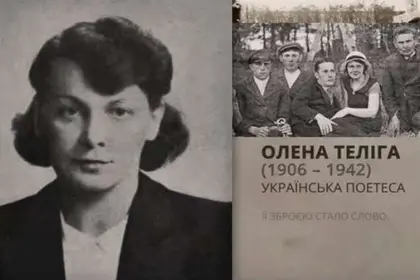The heroine of my story has been described by one of her contemporaries as “the greatest female figure in Ukrainian literature after Lesia Ukrainka.” Another considered that: “with her creative life and heroic death, she became a new symbol of the immortality of the Ukrainian nation.”
The story is about Olena Teliha, a Ukrainian poet and activist who defied the Nazi authorities in German-occupied Kyiv in the 1940s, and paid for it with her life.
JOIN US ON TELEGRAM
Follow our coverage of the war on the @Kyivpost_official.
She was born 115 years ago in July 1907, in a village near Moscow, to Ukrainian parents. The family moved to Kyiv in 1918.
Her father was a professor at the Polytechnic Institute, then in May 1920 he was appointed director of the Water and Road Management Department of the Ministry of Roads of the Ukrainian People’s Republic. In November of the same year, he went into exile. Later he became the rector of the Ukrainian Academy of Economics in the city of Podebrady.
Teliha left Soviet-ruled Ukraine with her mother and brother Serhiy in 1922. She lived in Poland, then in Czechoslovakia. Eventually, she then graduated from the historical and philological department of the Ukrainian Pedagogical Institute in Prague. There she met the engineer and bandurist Mykhailo Teliha, and they married in 1926.
In Czechoslovakia, Teliha blossomed professionally as a Ukrainian poet, publicist, and literary critic. After her mother died in 1929, she and her husband moved to Warsaw where she continued on her literary path.
Teliha’s life became more dramatic as World War II began. There are reports that in order to scrape together a living, in Warsaw, Teliha was forced to sing in night cabarets, work as a model, and as a primary school teacher.
In December 1939, in Krakow, Teliha met Oleh Olzhych (Kandyba), a leader of the Ukrainian nationalist movement. Under his influence she joined the Organization of Ukrainian Nationalists (OUN). She was in Andrii Melnyk’s faction (opposed by the Bandera faction) and worked in the cultural and educational spheres.
In October 1941, after Nazi Germany invaded the Soviet Union, Teliha was back in Kyiv. She headed the Union of Ukrainian Writers, opened a food point for her associates, and cooperated with the newspaper Ukrainske Slovo, edited by Ivan Rohach, which was located on Bulvarno-Kudryavska Street. In addition, she organized the publication of the literary and art weekly publication “Litavry.”
After many years of the Bolshevik dictatorship, the people of Kyiv began publicly talking about the revival of Ukrainian statehood. National symbols appeared and churches held masses in the Ukrainian language. However, the Nazis were hostile to these expressions of patriotism and began repressing Ukrainian nationalists.
After Rohach was arrested, Teliha defiantly ignored the instructions of the Germans. “Litavry” was banned. On Feb. 7, 1942, arrests began. Her friends warned her that the Gestapo was preparing an ambush on Triochsvyatitelsky Street, where the Union of Ukrainian Writers was located. She made her choice. She was not going to run away. In a private conversation, she said: “I will not leave Kyiv to emigrate again! I can’t do this.”
In her last letter from Kyiv, she said: “We walked yesterday evening near the snow-covered university. We were white and so frozen that we could not move our mouths. We walked from the cold building of the Union to the cold house… But behind the snow and winds, we can already feel a bright sun and green spring.”
In one of her poems, she asked God to give her the greatest gift: “A hot death, not cold extinction.”
Later that month, Teliha and her husband were arrested. In prison, she met Lesia Ukrainka’s sister and managed to exchange a few words with her.
Teliha is reported to have left her last autograph on the gray Gestapo wall. It was a trident drawn bearing the inscription: “Here was imprisoned and from here goes before the firing squad Olena Teliha.”
She and her husband were shot at a place now known to the whole world – Babyn Yar, the site where Kyiv’s Jews were executed by the Nazis in September 1941, to be followed by representatives of other nations and groups, including Ukrainian nationalists.
In 1992, Teliha’s poems were published for the first time in Ukraine. And in 2017 a remarkable monument of this amazing woman was erected in Babyn Yar.
Her contemporary, publicist, and nationalist ideologue, Dmytro Dontsov, wrote of her: “She is extraordinary in her images and ideas, complete as rarely anyone else, and elegant in her poetry. In her physique of a ‘strong-legged Diana,’ she is a mistress in any matter…proud in her guidance for life. She left us the image of intelligent poetry in the best sense of the word. This poetry is devoid of everything vulgar and simple.”
Another famous Ukrainian writer, Yevhen Malaniuk, claimed that Teliha’s personality was far greater than her literary heritage: “As an entity she was a kind of protest against the grayness, colorlessness, nausea of life… She was a person who wanted joy in the royal sense of this word.”
American writer Ernest Miller Hemingway once wrote: “A man can be destroyed but not defeated.” These words are perhaps a perfectly poignant epitaph to the biography of Olena Teliha.
You can also highlight the text and press Ctrl + Enter




